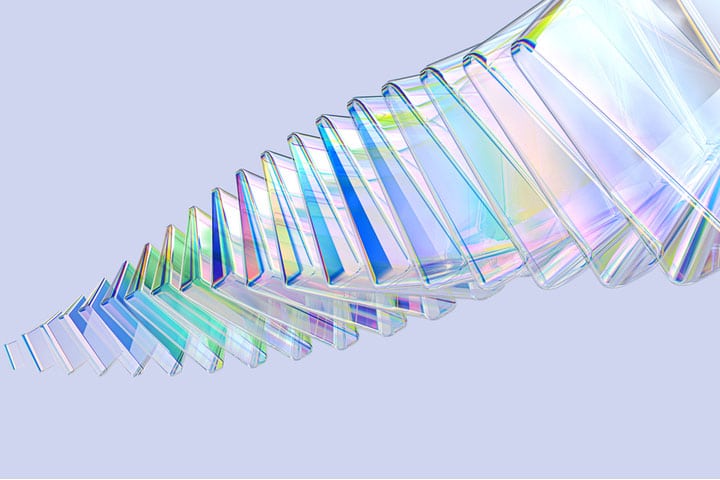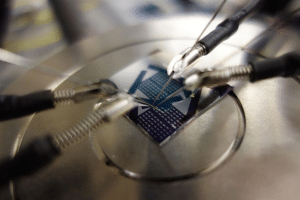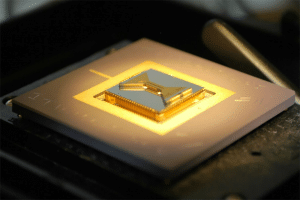
Silicon Nitride Thin Films for Optical Applications

Silicon nitride film, as a typical optical thin film material, has an important application value in the field of optical thin film. Its excellent optical properties and chemical stability make it widely used in optical components. Silicon nitride film not only has high transmittance and high anti-reflection properties, but also has high hardness and wear resistance, which makes the optical device surface coated with silicon nitride film can effectively enhance the optical performance and service life of the device. Therefore, the application of silicon nitride film in the optical field provides important support for the performance improvement and application expansion of optical devices.
Silicon Nitride (SiNx) Film Applications
Anti-Reflective Coating (AR Coating)
- Function: Used on the surface of optical lenses, camera lenses, eyeglasses, monitors, etc. to reduce reflection and improve light transmission.
- Working Principle: By choosing the right thickness and refractive index, the reflection is reduced and the light transmission is increased.
- Advantage: High refractive index and good optical transparency, effectively reducing reflections.
Reflector coating
- Role: Used in laser mirrors and other optical reflection devices to increase reflection efficiency.
- Working Principle: Alternate stacking with other materials to form Bragg mirrors to optimize reflective spectral properties.
- Advantage: High reflectivity and broadband reflective properties for high performance optical systems.
protective coating
- Role: Used for laser windows, optical sensors, microscope lenses, etc., to protect the surface of optical components from environmental erosion and mechanical damage.
- Working Principle: Silicon Nitride film has excellent chemical stability and mechanical strength, which can effectively protect the surface of optical components.
- Advantage: Increase the service life of optical components and keep their optical performance stable.
waveguide
- Function: Used as a waveguide layer in optical integrated circuits and photonics devices to conduct optical signals.
- Working Principle: Silicon Nitride film acts as a high refractive index waveguide layer to efficiently conduct light and reduce light loss.
- Advantage: Provides low loss, high refractive index waveguide materials suitable for high density optical integration.
interference filter
- Function: Used in spectrometers, filters, sensors, etc. to selectively transmit light of specific wavelengths.
- Working Principle: By precisely controlling the thickness and refractive index of the silicon nitride film and other materials, a multi-layer interference structure is formed to realize selective transmission or reflection at specific wavelengths.
- Advantage: Provides optical filtering performance with high selectivity and high transmittance.
optical modulator
- Function: Used as a modulator in optical communication systems to realize data transmission by modulating optical signals.
- Principle of operation: Silicon nitride film is used as the active layer of the modulator to modulate the optical signal through electro-optic or thermo-optic effects.
- Advantage: Fast response and high modulation efficiency for high-speed optical communication applications.
ICPCVD (Inductively Coupled Plasma Chemical Vapor Deposition) andPECVD (Plasma Enhanced Chemical Vapor Deposition)There are obvious advantages in the preparation of silicon nitride films, the two cvd methods can achieve higher deposition rate, lower deposition temperature, better film uniformity and film quality, and at the same time can realize the precise control of the film structure and properties, suitable for large-area uniform deposition, with process stability and reproducibility and so on.
ICPCVD and PECVD each have their own advantages and areas of application, and the choice of which method to use depends mainly on the specific application needs and process requirements.Learn more
We offer Chemical Vapor Deposition (CVD) OEM Customization Services, Feel free to leave a message to inquire.
Principles and Advantages of Plasma Enhanced Chemical Vapor Deposition (PE-CVD)
Principles and advantages of plasma enhanced chemical vapor deposition (PE-CVD)
Properties of diamond films and their applications
Properties of diamond films and their applications Diamond has a range of excellent properties
Influence of the annealing process on the platinum resistance
Influence of the annealing process on platinum resistors In the field of high-precision temperature measurement, thin-film



.jpg)